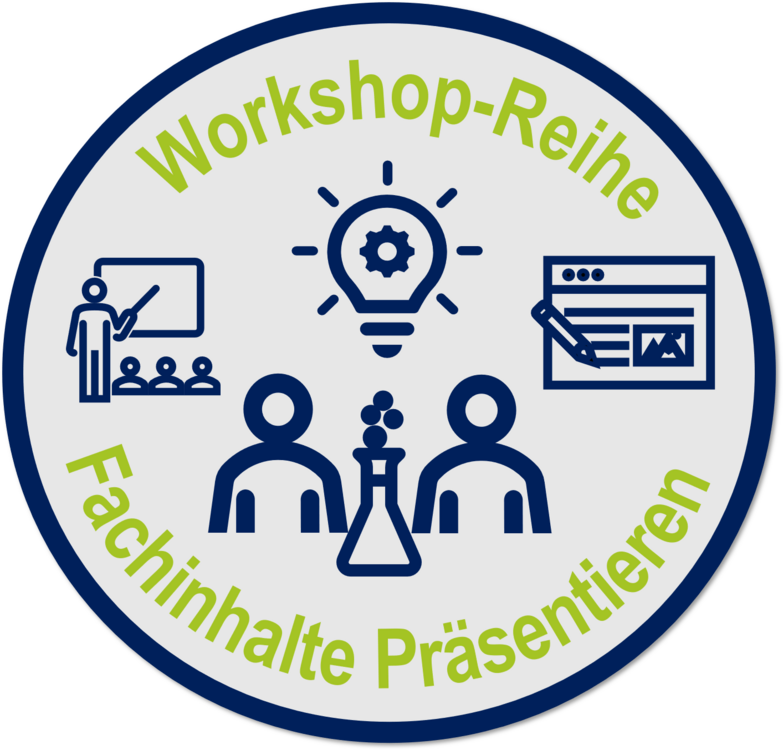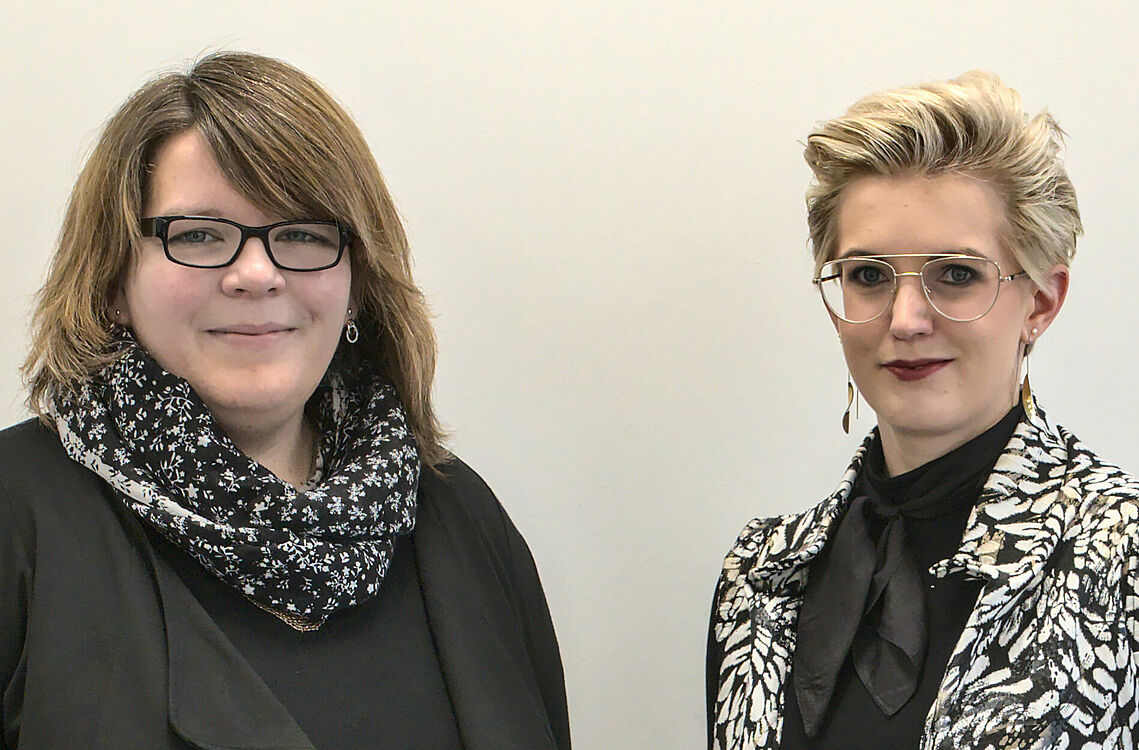Aims of the workshop series

As part of their degree programme, students should also acquire the skills to present specialist content in order to prepare them for their future careers. If they pursue a career in research after graduation, they must regularly present their research results in the form of lectures or posters at scientific conferences or in the form of papers in scientific journals. If they wish to pursue a career in business, they will also have to regularly present their projects in written and spoken form.
Three presentation formats are addressed in the workshop series on presenting specialised content in physics : Scientific writing, giving talks and creating posters. In addition, one workshop deals with the comprehensive topic of literature research and analysis. So far, the workshops have been implemented in presence according to the flipped classroom approach in courses on the Bachelor's degree programme in Physics and the Master's degree programme in Materials Science.
This online offer should enable everyone interested to individually improve their own communication skills and to deepen them for their next challenge (thesis defence, conference presentation, seminar talk, ...).
Interested teachers can contact Anna Bauer for the materials and further information on implementing the materials.
Team

We, Anna Bauer and Katharina Brassat, are a team with a background in didactics of physics and in science of physics/chemistry. Together, we have developed this workshop programme to support science students in acquiring communication skills for presenting scientific content in various typical formats and to share our experiences with them. In 2020, we received the Teaching Award for Young Scientists for the basic idea and implementation.
Anna Bauer and Michael Rüsing were also successful in acquiring funding from the Foundation for Innovation in Teaching and can therefore expand the workshop series to include the topic of "Scientific Writing".
Didactic approach
All workshops are didactically structured according to the Cognitive Apprenticeship approach [1] in order to achieve the highest possible degree of subject relevance and accompanied learning growth. In simple terms, the didactic principle can be described as "demonstrate, imitate, do it yourself". In the individual learning videos, the lecturer uses an example from his everyday research (report, presentation, poster) to make his cognitive processes transparent to the students when creating and presenting the various formats and derives corresponding action steps for the learners. After short input phases, the students have the opportunity to apply the presented procedure to their own projects. In the subsequent self-study phase, learners receive further support through coaching.
[1] Collins, A., Brown, J. S., & Newman, S. E. (1989). Cognitive-apprenticeship: Teaching the crafts of reading, writing, and mathematics. In L. B. Resnick (Ed.), Knowing, learning, and instruction. Essays in honour of Robert Glaser. Hillsdale, NJ: LEA, 32-42.
References
Honoured with the Teaching Award for Young Academics 2020, Presidential Board Paderborn University
Comments from participants:
"Very compact content that will help me to build up confidence for my future presentations."
"[I particularly like] the integration of a real lecture with explanation based on it."
"Many examples and instructions, especially the 'transporting' [of content] from paper to poster [I find particularly good]"
"Keep conducting them [the workshops] so as you can guide us through your earned experience."
"You immediately feel like working on the poster"
"[I liked most] input regarding the slide preparation, how to structure the talk for presentations and body language. Even how to answer questions after the presentation."
How can the materials be used?
Each workshop module consists of learning videos, tasks to work on yourself, support materials and literature references. These will also be made available as OER in the future.
Teachers can efficiently incorporate the materials when preparing a presentation/poster/report in the course.
Learners can also use the materials for self-study without further integration into courses.
If the videos and specific tasks are processed chronologically , the presentation or poster can be planned and created 'on the side'!
Workshop module Literature research and analysis
While general tips on literature research and correct citation are given in all workshop modules, the (advanced) workshop Literature Research and Analysis explicitly deals with (subject-specific) research strategies, evaluation of specialised literature and the efficient reading of such articles. If possible, the following materials should be worked on chronologically.
Supplement:
Workshop module Designing and giving presentations
In the workshop module Giving & Designing Lectures , the typical target audience, structure and conception of scientific lectures, slide design, presentation style and dealing with questions are discussed. The following materials should, if possible, be worked on chronologically.
Materials:
Poster design workshop module
The workshop module Poster Design focuses on the typical design of scientific posters, with particular emphasis on layout, presentation of scientific data and text reduction.
Materials:
Example poster:
For a little inspiration, it is always worth looking at the posters of other scientists in the physics corridors.
- K. Brassat, D. Kool, J. Lindner: Correlation between morphology and coordination of nanopores created by block copolymer lithography
- K. Brassat, D. Kool, A. Taube, M. Schaper, J. Lindner: Morphology investigation of nanopores by block copolymer lithography on different material surfaces (EMRS, 2018)
- K. Brassat, A. Taube, D. Kool, L. Tasche, K. Hoyer, M. Schaper, J. Lindner: Ti-6Al-4V alloy: 3D printing of lightweight implantsand nanopatterning by self-assembly (EMRS, 2018)
- K. Brassat, D. Kool, J. Lindner: Joining self-assembly techniques: A route to hierarchical nanopores
- A. Bauer, S. Lahme, D. Woitkowski, C. Vogelsang, P. Reinhold: The Paderborn study entry phase in physics - A multi-perspective development and research programme (DPG 2019)
Workshop module Scientific Writing
The workshop module Academic Writing focusses on the subject-specific design of academic texts (Bachelor's and Master's theses) with a particular focus on the creation of a common thread and argumentative structuring.
The development of this module is funded by the Stiftung Innovationen in der Hochschullehre (STIL) in the Freiraum 2022 sponsors programme and is being developed in cooperation with Dr. Michael Rüsing.
Videos of the virtual workshops:
- Scientific writing in physics - Before you start
- Scientific writing in physics - About writing papers
- Scientific writing in physics - Tell a story
- Scientific writing in physics - Let's write: The abstract
- Scientific writing in physics - Let's write: Introduction and conclusion
- Scientific writing in physics - Let's write: Materials and methods
- Scientific writing in physics - Let's write: Results and discussion
- Scientific writing in physics - Deal with writer's block
Links to the papers used in the workshops:
Further reading
Topic Lectures:
- N. Duarte, slide:ology, O'Reilly Media, CA, 2008
- J.-L. Lebrun, When the scientist presents, World Scientific Publishing, Singapore, 2015
- B. Hey, Presenting in science and research, 2nd ed., Springer, 2019, online resource
- V. Gewin, Under the TED spotlight, Nature 568, 133 (2019)
- Uri Alon, How to give a good talk, Molecular Cell 36, 165 (2009)
- M. Springer, Uri Alon - How to give a good talk (Pizza lunch at Harvard medical school), Onlineressource
- M. Larkin, How to give a dynamic scientific presentation, Onlineressource
- B. Aronson, Mastering public speaking, online resource
- TED, Ideas worth spreading, online resource
- Neil A. Lewis, Jr, June Gruber, Jay J. Van Bavel , Leah H. Somerville, Three tips for giving a great research talk, Onlineressource
Topic Poster:
- B. Gundogan, K. Koshy, K. Kurar, K. Whitehurst. How to make an academic poster, Annals of Medicine and Surgery 11, 69 (2016).
- Makesigns, Scientific poster tutorials, online resource
- Anna Clemens. Tips designing scientific conference posters, online resource
- Mike Morrison. How to create a better research poster in less time, online resource
- Woolston, C. Conference presentations: Lead the poster parade. Nature 536, 115-117 (2016), online resource.
Topic: Target-oriented preparation of measurement data:
- Nussbaumer Knaflic, Cole; Kauschke, Mike. Storytelling with data : the basics of effective communication and visualisation with data. Munich : Verlag Franz Vahlen; 2017. library
- Nussbaumer Knaflic, Cole; Madden, Catherine [Illustrator]. Storytelling with data : let's practice! Hoboken, New Jersey : Wiley; 2020. library
